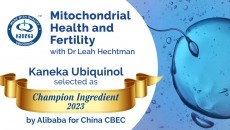Meso-zeaxanthin needed for eye health benefits for high-risk AMD population?

The macula is a yellow spot of about five millimeters diameter on the retina. As we age, levels of the pigments in the macula decrease naturally, thereby increasing the risk of age-related macular degeneration (AMD). The yellow color is due to the content of the carotenoids lutein and zeaxanthin, which we derive from the diet.
These compounds are the only carotenoids capable of filtering the harmful blue light than can damage cells in the eye, the rods and the cones.
A thin macular pigment can allow the blue light through and destroy the cells. Maintaining high levels of both carotenoids, and therefore the macular pigment, is a valid approach to maintaining eye health and reducing the risk of AMD.
Typical macular pigmentation is for a peak at the center of the macula, and this then decreases with increasing distance from the spot. However, some people have atypical macular pigmentation, which may make some individuals more susceptible to damage from blue light, and ultimately AMD.
According to new data published in Experimental Eye Research, macula pigment can be improved by a combination of lutein, zeaxanthin and meso-zeaxanthin. However, no such benefits were observed when meso-zeaxanthin was absent from the supplement.
“We report that enrichment of macular pigment across the full spatial profile (i.e. at 0.25°, 0.5°, 1°, 1.75°, 3°) was achieved only when subjects were supplemented with all three macular carotenoids, suggesting a beneficial and may be even an interactively additive effect of supplementing with all three carotenoids,” wrote researchers led by John Nolan from the Macular Pigment Research Group at the Waterford Institute of Technology.
Study details
Nolan and his co-workers recruited 31 people with atypical macular pigment profiles and randomly assigned them to one of three groups: The first group received daily supplements of 20 mg of lutein and 2 mg of zeaxanthin; the second group received 10 mg of meso-zeaxanthin, 10 mg of lutein, and 2 mg of zeaxanthin; and the third group received 17 mg of meso-zeaxanthin, 3 mg of lutein, and 2 mg of zeaxanthin.
After eight weeks of supplementation, the researchers recorded no significant increases in macular pigment distributions in the first group.
However, increases were observed both groups 2 and 3 at select positions on the retina.
“Of importance to this discussion, macular [meso-zeaxanthin] is produced primarily by isomerization of macular [lutein], thus accounting for lower relative levels of [lutein], and higher relative levels of [meso-zeaxanthin], in the central macula, and vice versa in the peripheral macula,” explained the researchers.
“It is possible, therefore, that the mechanism which converts [lutein] to [meso-zeaxanthin] at the macula is defective in individuals with no observable typical central peak of [macula pigment]. Indeed, the data presented here is consistent with this hypothesis.
“Importantly, however, we now confirm that subjects without a typical central peak in their [macula pigment] spatial profiles do respond to a supplement containing [meso-zeaxanthin] (as seen in Groups 2 and 3), but do not respond to a supplement containing high amounts of [lutein] (as seen in Group 1).”
Source: Experimental Eye Research
Published online ahead of print, doi: 10.1016/j.exer.2012.05.006
“Macular carotenoid supplementation in subjects with atypical spatial profiles of macular pigment”
Authors: J.M. Nolan, M.C. Akkali, J. Loughman, A.N. Howard, S. Beatty
















